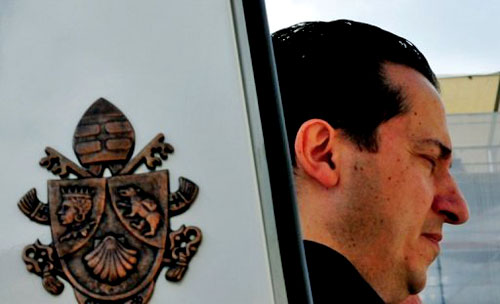|

15 August 2012
from
France24 Website

The Vatican has hailed its report on the
decision to put the pope's butler on trial as
proof of its transparency, but critics suspect
the secretive state of diverting attention from
its scandals.

Pope Benedict XVI walks past a Swiss Guard in
the courtyard of his summer residence in
Castelgandolfo on August 8, 2012. The pope's
butler, on trial for or leaking secret papers,
said he did it to draw the pope's attention to
the Holy See's murky goings-on.

File photo of Pope Benedict XVI's former butler
Paolo Gabriele who is to go on trial over
stealing and leaking secret papal documents to
the media. Despite Gabriele's insistence that he
worked alone, many religious observers believe
the operation was far too big to be orchestrated
by one man and the media have speculated over
whether he was a pawn in a wider plot to grab
power.
AFP
The Vatican has hailed its report on the
decision to put the pope's butler on trial as proof of its
transparency, but critics suspect the secretive state of diverting
attention from its scandals.
The Church has been plagued by controversy in recent years, from
allegations of
money laundering and criminal associations
to
child sex abuse, and has been
repeatedly accused by critics of covering up its sins to protect
insiders.
To prove its commitment to openness, the Vatican marked its decision
to charge butler Paolo Gabriele for leaking secret papers to
the media by releasing the full statements made by the magistrate
and others concerned.
Details were also revealed about another Holy See employee, who has
been charged with aiding and abetting Gabriele.
Only the names of the witnesses who were
interrogated during the inquiry were obscured for the sake of due
process.
"A publication this sweeping and
complete is a courageous and rather unusual act for the
Vatican," said Holy See spokesman Federico Lombardi.
"It is a concrete step... to confront problems rigorously and
transparently, without shortcuts or secretiveness," he added.
Gabriele risks up to six years in prison
if found guilty of "aggravated theft."
He admits stealing but says he was
driven to leak the private documents to the press to draw the pope's
attention to the Holy See's murky goings-on.
Frustrated by the "series of unresolved mysteries" and poisonous
atmosphere in a state ripe for scandal, the 46-year-old smuggled out
letters and documents regarding corruption, the clerical pedophilia
and an internal power struggle.
Despite Gabriele's insistence that he worked alone, many religious
observers believe the operation was far too big to be orchestrated
by one man and the media have speculated over whether he was a pawn
in a wider plot to grab power.
"The Church wants only one sinner,"
the left-wing La Repubblica daily said when the news broke,
accusing the Vatican of using Gabriele as a scapegoat.
There is also a sense that there may be
an attempt to undermine the butler's testimony by discarding the
original description of him as a model employee, in favor of citing
mental health experts who say he has "paranoid tendencies."
In his statements, Gabriele said he saw,
"evil and corruption everywhere in
the Church," accusations critics say the Vatican appears to have
ignored.
"As the magistrate said (in his report), there are still things
that need to be cleared up," Marco Politi, Vatican expert for Il
Fatto Quotidiano, told AFP.
"The cardinals' report must be published as well," he said,
referring to the inquiry into the leaks being carried out by a
trio of investigating cardinals.
Critics say the butler's trial actually
means the larger issues raised by the leaks are being glossed over.
"Hallelujah. It was the butler's
fault. The Vatican is holy and immaculate," said Il Fatto
Quotidiano daily, lamenting that the case "concerns just the
documents theft... not what the documents revealed: corruption,
waste, theft".
Adriano Prosperi for La
Repubblica asked:
"Does anyone in the Vatican really
think it is possible to conclude in this manner a sequence of
facts which have been troubling the consciences of Catholics the
world over?"
To show its commitment to
transparency, the Vatican has hired a new media representative
to improve its communications strategy, opened up its secretive bank
to the press and called in independent experts to examine its books.
It has also said the investigation into the leaks scandal is not
over, suggesting that there may be further interrogations and
arrests to come.
Whatever happens, the Vatican will have to work hard to convince
skeptics that it really is ready to open itself up to external
scrutiny.
|



